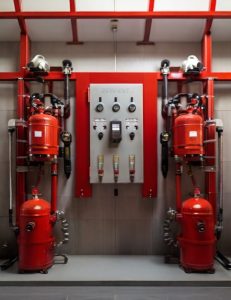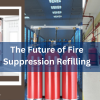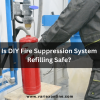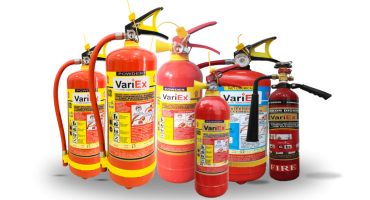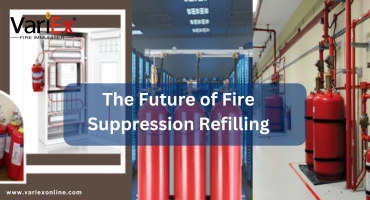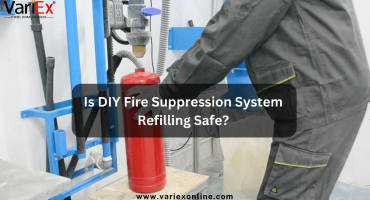![]()
Fire Immuniser
+91-7829629111
Email: info@variex.in
Varistor Technologies Pvt. Ltd.
Block-1, First Floor, Ardente Office One, Hoodi Circle, ITPL Main Road, Bengaluru, Karnataka 560048, IN
Disadvantages Of Fire Fighting System
While fire fighting systems are essential for protecting lives and property from the devastating effects of fires, they also have certain limitations and disadvantages. Understanding these drawbacks is crucial for effectively managing fire risks and implementing appropriate safety measures. Here are some common disadvantages associated with fire fighting systems.
Limited Effectiveness Against Certain Types of Fires:
- Fire fighting systems may be less effective against certain types of fires, such as electrical fires or fires fueled by flammable metals. Water-based suppression systems, for example, may not be suitable for extinguishing electrical fires due to the risk of electrical shock.
Potential Water Damage:
- Water-based fire suppression systems, such as sprinklers or hose reels, can cause water damage to property and equipment, even if they successfully extinguish the fire. This can result in costly repairs and downtime for businesses.
False Alarms and Malfunctions:
- Fire detection and alarm systems may be prone to false alarms or malfunctions, leading to unnecessary evacuations, disruptions, and loss of productivity. Malfunctions in fire suppression systems can also occur, compromising their effectiveness during emergencies.
Maintenance and Inspection Requirements:
- Fire fighting systems require regular maintenance and inspection to ensure they are in proper working condition. This can be time-consuming and costly for building owners and managers, particularly for larger systems or systems with complex components.
Dependency on External Factors:
- The effectiveness of fire fighting systems may depend on external factors such as water supply availability, power supply reliability, and accessibility for emergency responders. In remote areas or during natural disasters, these factors can pose challenges for fire suppression efforts.
Environmental Concerns:
- Some fire suppression agents, such as certain types of fire retardants or chemicals used in gas-based suppression systems, may pose environmental risks or contribute to air and water pollution. Careful consideration of environmental impacts is necessary when selecting and using fire fighting systems.
Cost Considerations:
- The installation, maintenance, and operation of fire fighting systems can be costly, particularly for larger or more complex systems. Building owners and managers must weigh the costs against the potential benefits of fire protection when planning their budgets.
Occupant Safety Concerns:
- In rare cases, fire fighting systems may pose safety risks to building occupants, such as accidental activation of sprinkler systems causing slips and falls, or exposure to suppression agents causing respiratory irritation. Proper training and education are essential to mitigate these risks.
Despite these disadvantages, fire fighting systems remain essential for protecting lives and property from fire-related hazards. It is essential to carefully evaluate the specific risks and requirements of each building or facility and implement appropriate fire protection measures to minimize the potential drawbacks associated with fire fighting systems. Regular training, maintenance, and periodic reviews of fire safety plans are essential for ensuring the effectiveness and reliability of fire protection measures over time.
Frequently Asked Questions
What are fire fighting systems, and why are they important?
- Fire fighting systems are designed to detect, suppress, and extinguish fires to protect lives and property. They are essential for minimizing the impact of fires and ensuring the safety of occupants within buildings and facilities.
What are the different types of fire fighting systems available?
- Common types of fire fighting systems include fire detection and alarm systems, fire suppression systems (such as sprinkler systems, gas-based systems, and foam systems), and fire extinguishers. Each system is designed to address specific fire hazards and environments.
How do fire detection and alarm systems work?
- Fire detection and alarm systems use sensors, detectors, and alarm devices to detect signs of fire, such as smoke, heat, or flames. Once a fire is detected, the system activates alarms to alert occupants and trigger appropriate emergency response actions.
What is the role of fire suppression systems in fire protection?
- Fire suppression systems are designed to suppress or extinguish fires once they are detected. These systems use various agents, such as water, gas, or foam, to smother or cool the fire and prevent its spread.
How often should fire fighting systems be inspected and maintained?
- Fire fighting systems should be inspected and maintained regularly to ensure they are in proper working condition. The frequency of inspections and maintenance depends on factors such as system type, usage, and regulatory requirements.
What should I do in the event of a fire alarm activation?
- In the event of a fire alarm activation, occupants should follow established emergency procedures, evacuate the building via designated escape routes, and assemble at designated assembly points. It is essential to remain calm and follow the instructions of trained personnel.
Can fire fighting systems cause false alarms?
- Yes, fire fighting systems, particularly fire detection and alarm systems, can occasionally experience false alarms due to factors such as dust, steam, or cooking fumes triggering the sensors. Proper system maintenance and sensitivity adjustments can help minimize false alarms.
Are fire fighting systems environmentally friendly?
- While fire fighting systems play a crucial role in fire safety, some suppression agents and system components may have environmental impacts. It is essential to select systems and agents that minimize environmental risks and comply with relevant regulations.
Final Say
We at VariEx.in or Variexonline.com have mastered the art of designing, installing, inspecting, and fixing automatic sprinkler systems with the help of our in-house team, which is capable of delivering the fire sprinkler services you need, whether large or small and at affordable cost.
To schedule a fire sprinkler installation, or you think our services could benefit your commercial property, contact us online or give us a call at, 7829629111


